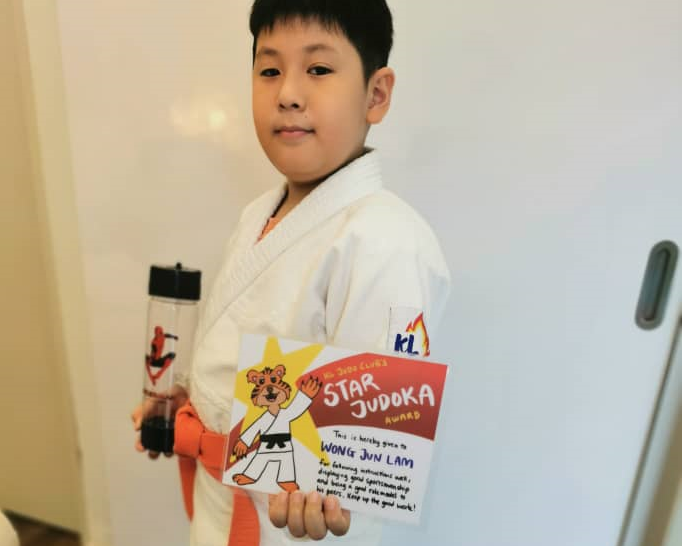
A big part of judo training for kids has nothing to do physicality (although judo is a very physical sport). It has to do with attitude, behavior and values. One way to encourage positive qualities is to reward them with tokens (little plastic coins) whenever they exhibit such qualities.
The first kid to accumulate 40 tokens (and the Star Judoka award) is Jun Lam, who is one of the pioneering kids in our children's class. He's been with us from the start and he consistently displays excellent qualities of a judoka.
He follows instructions well. He is always willing to help out other kids and newcomers. He displays good sportsmanship when he loses. Overall, he's a very positive role model for other kids.
There are many things some adult players can learn from someone like Jun Lam. Take for example the part about following instructions well. In the case of kids, some might actually be too young to easily comprehend some of the more complex moves. Adults, on the other hand, don't have that excuse. They understand what's being taught yet there are times when they don't seem to get it.
You tell them to grab the far lapel not the near one. Yet when they do it, they grab the near lapel. You tell them to keep their knees straight when doing a particular technique, yet they bend them. You tell them to always adopt a high grip yet they take a low one. Why?
Not because they can't understand your instructions. It's because their heads are in the clouds when you are teaching. They're not paying attention. They're not bothered. They think they can wing it and just do whatever comes naturally to them and it will be right. Well, they are wrong. Judo techniques are extremely difficult to master. You have to pay attention to detail when learning techniques.
Now, for the part about helping others. If your training partner is doing a technique wrongly, surely you will correct them, right? Not always. There are players who do nothing and say nothing, and allow their partners to carry on doing the wrong things.
Why they are that way? It could be that their heads are in the clouds again and they are oblivious to what their partner is doing. Or, it could be that they know their partner is doing the technique wrongly but they are not bothered to correct them. Either way, it's bad. A true judoka would notice the mistake and a true judoka would point it out to their partner (and show them how to do it the right way).
Lastly, about good sportsmanship. In judo, sometimes we win, sometimes we lose. Nobody wins all the time. When you lose, you must be willing to accept that on that particular occasion, the better player won.
Don't give excuses. Don't say you're tired because you've had a hard day at work or that you didn't have a proper meal before coming to judo practice. Or that you didn't get much sleep last night. All that may actually be true, but so what? Even if you have a stomach ache or are feeling a bit under the weather, so what?
Why would you even bring up such things when you lose? If you lose, you lose lah. Be a good loser and congratulate your partner for fighting you well. Then use your defeat as motivation to beat them the next time.
There are, of course, many more things about attitude and behavior that I could talk about but let's save that for another posting. To conclude this post, I would like to encourage adult players to learn from young judokas like Jun Lam, who has the right attitude and spirit to be worthy of being called a star judoka.
At KL Judo, we are a very competition-oriented club. We want our players to do well in competitions. But more than that, we want our players to be good people, with exemplary qualities both on and off the mat. Judo is a sport (and an Olympic one, at that) but it's more than sport. Judo is training for life.
